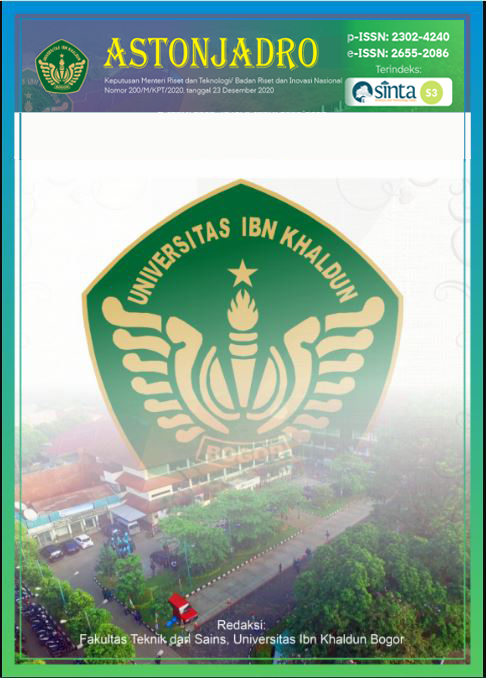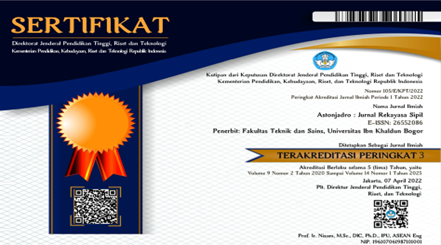Analysis of Barriers that Affect the Success of the “Zero Waste North Lombok” Program
DOI:
https://doi.org/10.32832/astonjadro.v13i1.14390Keywords:
waste management; zero waste; barriers; fuzzy logic; DEMATEL.Abstract
Waste management is a cross-cutting issue that is closely related to various global challenges. At the local government level, waste management services carried out demonstrate the sustainability of a city so that local governments are responsible for finding affordable waste management solutions with the least impact on the environment. North Lombok Regency has a waste management problem that results in the realization of its handling not reaching the target. To overcome the waste management problem, the local government initiated a priority development program "Zero Waste North Lombok" which is expected to address the existing problems. In the process, the implementation of the program has not run significantly. To support the achievement of the program, a study of the barriers to zero waste was conducted using the fuzzy DEMATEL method. This method is able to facilitate the identification of causal relationships between criteria assessed in complex systems so as to provide information on various perceptions for stakeholders. The 12 barriers identified were divided into two groups: influential barriers and receptive barriers. The influential barriers consist of lack of policies and regulations on waste, lack of cooperation among stakeholders, uncertainty about circular economy targets and strategies, and inadequate sanctions and fines. While the influential group of barriers consists of the barriers of lack of environmental awareness, inadequate recycling techniques, inadequate methods for sorting, transporting and recycling waste, lack of financial and economic assistance, lack of advertising and media coverage for waste management, lack of adequate areas for waste collection and sorting, lack of awareness about environmental protection and lack of temporary shelters. This group of influential barriers needs to be considered and addressed by the local government so that the goals of the "Zero Waste North Lombok" program can be achieved.
References
Abdullah, L., Zulkifli, N., Liao, H., Herrera-Viedma, E., & Al-Barakati, A. (2019). An interval-valued intuitionistic fuzzy DEMATEL method combined with Choquet integral for sustainable solid waste management. Engineering Applications of Artificial Intelligence, 82(April 2018), 207–215. https://doi.org/10.1016/j.engappai.2019.04.005
Akyuz, E., & Celik, E. (2015). A fuzzy DEMATEL method to evaluate critical operational hazards during gas freeing process in crude oil tankers. Journal of Loss Prevention in the Process Industries, 38, 243–253. https://doi.org/10.1016/j.jlp.2015.10.006
Ayçin, E., & Kaya, S. K. (2021). Towards the circular economy: Analysis of barriers to implementation of Turkey’s zero waste management using the fuzzy DEMATEL method. Waste Management and Research, 39(8), 1078–1089. https://doi.org/10.1177/0734242X20988781
Dou, Y., Sarkis, J., & Bai, C. (2014). Government green procurement: A Fuzzy-dematel analysis of barriers. Studies in Fuzziness and Soft Computing, 313, 567–589. https://doi.org/10.1007/978-3-642-53939-8_24
Edwards, J., Burn, S., Crossin, E., & Othman, M. (2018). Life cycle costing of municipal food waste management systems: The effect of environmental externalities and transfer costs using local government case studies. Resources, Conservation and Recycling, 138(June), 118–129. https://doi.org/10.1016/j.resconrec.2018.06.018
Khan, F., & Ali, Y. (2022). A facilitating framework for a developing country to adopt smart waste management in the context of circular economy. Environmental Science and Pollution Research, 29(18), 26336–26351. https://doi.org/10.1007/s11356-021-17573-5
Khaw-ngern, C. (2021). Circular Economy: A milestone for Zero Waste Municipality. Psychology and Education Journal, 58(1), 1418–1424. https://doi.org/10.17762/pae.v58i1.923
Lin, R. J. (2013). Using fuzzy DEMATEL to evaluate the green supply chain management practices. Journal of Cleaner Production, 40, 32–39. https://doi.org/10.1016/j.jclepro.2011.06.010
Muhammad, M. N., & Cavus, N. (2017). Fuzzy DEMATEL method for identifying LMS evaluation criteria. Procedia Computer Science, 120, 742–749. https://doi.org/10.1016/j.procs.2017.11.304
Nixon, J. D., Dey, P. K., & Ghosh, S. K. (2017). Energy recovery from waste in India: An evidence-based analysis. Sustainable Energy Technologies and Assessments, 21, 23–32. https://doi.org/10.1016/j.seta.2017.04.003
Nizar, M., Munir, E., Irvan, I., & Amir, F. (2019). Examining the Economic Benefits of Urban Waste Recycle Based on Zero Waste Concepts. 292(Agc), 300–309. https://doi.org/10.2991/agc-18.2019.47
Phonphoton, N., & Pharino, C. (2019). Multi-criteria decision analysis to mitigate the impact of municipal solid waste management services during floods. Resources, Conservation and Recycling, 146(December 2018), 106–113. https://doi.org/10.1016/j.resconrec.2019.03.044
Sadeghi Ahangar, S., Sadati, A., & Rabbani, M. (2021). Sustainable design of a municipal solid waste management system in an integrated closed-loop supply chain network using a fuzzy approach: a case study. Journal of Industrial and Production Engineering, 38(5), 323–340. https://doi.org/10.1080/21681015.2021.1891146
Tirkolaee, E. B., Abbasian, P., Soltani, M., & Ghaffarian, S. A. (2019). Developing an applied algorithm for multi-trip vehicle routing problem with time windows in urban waste collection: A case study. Waste Management and Research, 37(1_suppl), 4–13. https://doi.org/10.1177/0734242X18807001
Wilson, D. C., & Velis, C. A. (2015). Waste management - Still a global challenge in the 21st century: An evidence-based call for action. Waste Management and Research, 33(12), 1049–1051. https://doi.org/10.1177/0734242X15616055
Yadav, H. (2021). Analysing challenges to smart waste management for a sustainable circular economy in developing countries : a fuzzy DEMATEL study. https://doi.org/10.1108/SASBE-06-2021-0097
Zaman, A. U., & Lehmann, S. (2013). The zero waste index: A performance measurement tool for waste management systems in a “zero waste city.” Journal of Cleaner Production, 50, 123–132. https://doi.org/10.1016/j.jclepro.2012.11.041
Zhang, A., Venkatesh, V. G., Liu, Y., Wan, M., Qu, T., & Huisingh, D. (2019). Barriers to smart waste management for a circular economy in China. Journal of Cleaner Production, 240. https://doi.org/10.1016/j.jclepro.2019.118198.
Downloads
Published
How to Cite
Issue
Section
License
Copyright (c) 2023 ASTONJADRO

This work is licensed under a Creative Commons Attribution-ShareAlike 4.0 International License.
Paper submitted to ASTONJADRO is the sole property of the Astonjadro Journal. Unless the author withdraws the paper because he does not want to be published in this journal. The publication rights are in the journal Astonjadro.ASTONJADRO
LICENSE
This work is licensed under a Creative Commons Attribution-ShareAlike 4.0 International License.
Based on a work at http://ejournal.uika-bogor.ac.id/index.php/ASTONJADRO













